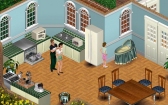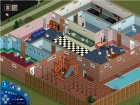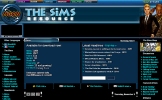|
 Development of "The Sims" moved ahead more rapidly. The team transitioned from research and development into a product development effort. The game was created out of many small contributions from the people working on it. Some parts were even developed by accident: the scrap book, for example.
"We had developed the scrap book as a debugging tool. We wanted a way in the game to take pictures and show those to each other. Almost immediately we realized that this was a fun toy and it ended up being one of the features in "The Sims" that helped our player community band together," London said. Development of "The Sims" moved ahead more rapidly. The team transitioned from research and development into a product development effort. The game was created out of many small contributions from the people working on it. Some parts were even developed by accident: the scrap book, for example.
"We had developed the scrap book as a debugging tool. We wanted a way in the game to take pictures and show those to each other. Almost immediately we realized that this was a fun toy and it ended up being one of the features in "The Sims" that helped our player community band together," London said.
How does the game work? The game is programmed to let objects in the environment advertise their capabilities and "draw" the Sims to them. "What we did was make the people really dumb," explains Wright, "and make the environment and objects really smart." Objects will always advertise to the Sims about what they can do for them. Depending on your character's personality needs relative to what the objects can offer, it will make a selection about how to spend time. "This all happens behind the scenes," explains Wright, "but basically the fridge yells at the player, 'I can satisfy hunger five!' and the bath says, 'Hygiene seven right here!'" In the end, all these factors tie into the happiness of the character.
Wright: "Once we got the behavioral model working for the Sims we found it to be quite fun. At that the point the game became a bit more focussed on the interactions between the Sims and not just between them and their environment.
So when it became more focused around the people, I started thinking about having them talk and interact, to have moods and relationships. It became real clear that we needed a pretty robust behavioral model, especially since the user would be designing the entire environment.
 To think back, I remember we had long discussions to decide whether or not to put children in the original game or not, it was just going to be adults. I think Claire and Roxy kinda pulled it into that direction. There were very specific things but they would be so detailed as to be boring. We had a long battle as to how many needs to have for the Sims, originally there were ten needs and then we eventually got down to eight. To think back, I remember we had long discussions to decide whether or not to put children in the original game or not, it was just going to be adults. I think Claire and Roxy kinda pulled it into that direction. There were very specific things but they would be so detailed as to be boring. We had a long battle as to how many needs to have for the Sims, originally there were ten needs and then we eventually got down to eight.
So that was just one example but we had plenty of things where we kept trying to pull out features to make it simpler and simpler.
There were a couple of things that were more realistic that we took out. And we did a lot of tweaking related to it. For instance, if the Sims don't like each other, you can get them to slap each other. We've got one that's kind of this bring your arm back, really wack them. It really rubbed a lot of people the wrong way. It felt very domestic violence-like. So we changed the programming, so that if a man is slapping a woman, you get more of this kind of British army officer polite slap. Slap, slap, slap, slap. It's kind of an insulting slap, rather than a sort of "I'm going to hurt you" slap.
So, we changed it because we wanted it to be accessible to a fairly young audience.
 We had a lot of discussions about how "story based" the game should be but it was pretty clear when you sat and played the game that the player was telling the story. This is something we decided early on. We'd kinda been down a couple paths: "Oh we should have tightly knit scenarios" and "You have to do this to win." That's closer to the path the console versions. But with the PC version we kind of toyed with the idea but decided the customization and the user brought-in experience was far more compelling. We had a lot of discussions about how "story based" the game should be but it was pretty clear when you sat and played the game that the player was telling the story. This is something we decided early on. We'd kinda been down a couple paths: "Oh we should have tightly knit scenarios" and "You have to do this to win." That's closer to the path the console versions. But with the PC version we kind of toyed with the idea but decided the customization and the user brought-in experience was far more compelling.
The marketing was brilliant! And it wasn't just the marketing. The General Manager of our studio, Luc Barthelet, took a very strong interest in building a community around the game cause we'd put this heavy emphasis on customization. We probably spent an extra year in development making so many parts of the game customizable. Had the game been a flop that would have been a wasted year. But if the game was a success then that year would be well worth it because of the community we could build around the game. We did some very innovative community events leading up to the launch.
Eight months before we shipped the game, we started with a mailing list for the very hardcore Sim City webmasters and we told them what we were doing and got their involvement very early on and they started building the first Sims websites.
About four months before ship, we started releasing these tools, and so at that point, we had a lot of people starting to invest time and effort into building content for the game. Two months before we shipped, we started what we call these Web cam events.

In our chatroom there was a live webcam of us playing the game. Then people in the chatroom were asking us "Can you make him do this?" or "What if he kisses this girl?" or "What if he goes and does that?" And then we'd say "Oh yeah we can do this" and we'd have them walk around and do stuff.
Now the interesting thing about this was that they could capture every image we were sending them and use on their website. Now this did two things. First of all it gave them a really good sense for how open ended the game was. We would prove that just about anything you can imagine you can do in this game. But the second and probably more important thing is that we had all these websites.
Some of the first Sims websites:
   
I thought that marketing might drop the ball. I thought that this was a game that I would enjoy playing from square one, otherwise I wouldn't have spent so much time and effort on it. As we got closer to release I had much higher confidence levels, but even then I thought that either marketing would kind of screw it up and the game would be a flop or it would be a pretty big success. But I didn't anywhere near foresee the success it became. At the time I thought 'maybe it might be as big as SimCity.'"
In February 2000, The Sims came out with little advance word or buzz. Since then, the game has broken all sales records because of its approachable subject matter and its ability to unleash a player's creativity.
Wright: I remember the very first review we got was actually quite negative. It was some little website and somebody just wrote a pretty scathing review of the game. It was pretty depressing reading that first review, but it was like two days later before every other review came out that was raving about the game. So that first review kind of rattled me, like "Oh my God they didn't get it. I hope somebody else gets it!" But it was pretty temporary."
Within a year, The Sims became Wright's biggest hit.
| 
